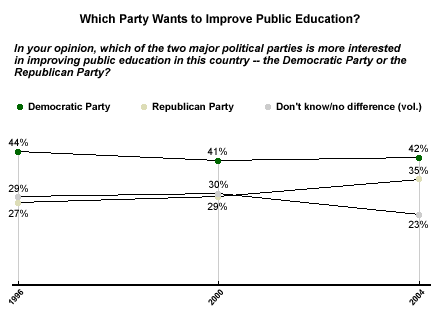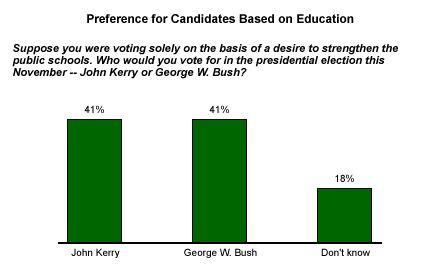This article contains findings from the 36th Annual Phi Delta Kappa/Gallup Poll of the Public's Attitudes Toward the Public Schools, released on Aug. 24 in Washington, D.C.
In America's political party system, the Republican Party has traditionally been associated with foreign policy and national defense issues, while the Democratic Party has traditionally been linked to domestic and social issues, including education. However, the Democratic Party focused most of its convention in July on national security and defense, and the Republican Party's 2004 platform (which has been somewhat of a secret until its convention) is expected to focus more on domestic and social issues.
The policy shifts may be attempts to attract nonsupporters and counteract traditional perceptions, but they may partly explain the division found in the 2004 Phi Delta Kappa/Gallup Poll of the Public's Attitudes Toward the Public Schools*: Americans are almost evenly divided in their opinions on which party -- and which presidential candidate -- is more equipped to improve public education.
The PDK/Gallup poll asked U.S. adults which of the two parties "is more interested in improving public education in this country." Forty-two percent of respondents chose the Democratic Party, but 35% chose the Republican Party -- a seven percentage-point difference (23% answered "don't know").
The gap between Democrats and Republicans on this question has narrowed substantially over the last three presidential elections. In August 1996, when Bill Clinton was running for re-election, 44% of Americans viewed the Democratic Party as more interested in education and 27% felt that way about the Republican Party -- a 17 percentage-point gap (15% of respondents felt there was no difference between the parties and 14% didn't know). The gap shrunk to 12 percentage points during the George Bush-Al Gore race in 2000, when 41% of Americans felt the Democrats were more interested in education and 29% chose the Republicans (30% didn't know).

Bush or Kerry?
In addition to the Republican Party's attempts to address social issues, one of the reasons why Americans may be starting to view the Republican Party as more interested in education could be Bush's emphasis on education reform in his presidency. In 2001, Bush passed one of the most sweeping pieces of education legislation in U.S. history -- the No Child Left Behind Act.
Bush's education policy obviously advocates a continued focus on NCLB, which requires every state to measure the success of its schools using standardized testing, and gives parents the option of transferring their children out of schools that are classified as "failing." Democratic candidate John Kerry's plan focuses on creating a National Education Trust Fund to expand funding of NCLB, and a "New Bargain for America's Children and Teachers" that aims to recruit half a million new teachers over the next four years.
The 2004 PDK/Gallup poll asked respondents which candidate they would pick -- Bush or Kerry -- if they were voting solely out of a desire to improve public schools. The two candidates are dead even, with 41% of Americans choosing Bush and 41% choosing Kerry as the best bet for improving public schools. Eighteen percent of respondents chose neither candidate.

A more recent Gallup Poll**, conducted Aug. 23-25, showed Kerry with a slight advantage over Bush when the public was asked which candidate would better handle the education issue. Forty-eight percent say Kerry and 43% say Bush.
Bottom Line
The education issue -- customarily a Democratic stronghold -- appears to be up for grabs this year. Although Bush's satisfaction ratings on his handling of education have dropped in recent years (see "Bush's Education Rating Hits Low Point" in Related Items), Americans seem to be divided on which candidate, or which political party, will fulfill their expectations for the future of American education.
*The findings of the survey are based on telephone interviews with a random sample of 1,003 U.S. adults, aged 18 and older, conducted from May 28 to June 18, 2004. For results based on this sample, one can say with 95% confidence that the maximum error attributable to sampling and other random effects is ±3 percentage points.
**Results are based on telephone interviews with 1,004 national adults, aged 18 and older, conducted Aug. 23-25, 2004. For results based on the total sample of national adults, one can say with 95% confidence that the margin of sampling error is ±3 percentage points.